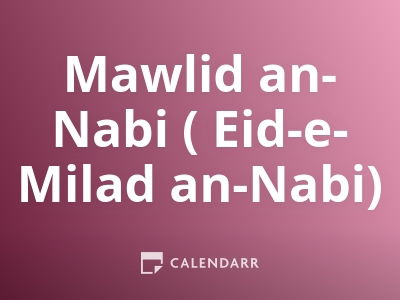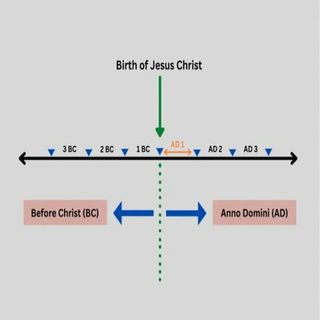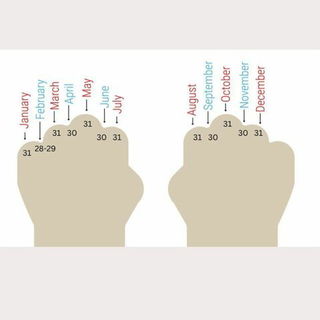- Calendar
- Calendar 2026
- August
- Mawlid an-Nabi ( Eid-e-Milad an-Nabi)
Mawlid an-Nabi ( Eid-e-Milad an-Nabi)
Mawlid an-Nabi, also known as Eid-e-Milad an-Nabi, is observed on the 12th day of Rabi’ al-Awwal, the third month of the Hijri calendar.
In 2025, this sacred day is expected to begin on the evening of September 4 and continue into September 5, according to the Gregorian calendar.
Celebrated by many Muslims around the world, both Sunni and Shia, Mawlid an-Nabi commemorates the birth and life of the Prophet Muhammad with gatherings, poetry, prayers, and communal meals.
The word Mawlid comes from the Arabic root walad, which means “to give birth” or “descendant.”
Today, Eid-e-Milad an-Nabi is a public holiday in numerous Muslim-majority countries, including Egypt, Pakistan, Indonesia, Turkey, Sudan, and the UAE.
Origin of Mawlid Date
Most Sunni Muslims and many Shia Muslims believe that Prophet Muhammad was born on the 12th of Rabi' al-Awwal, the third month in the Islamic calendar.
Meanwhile, some Twelver Shia Muslims say his birthday is on the 17th of Rabi' al-Awwal. This difference is a well-known disagreement among scholars.
Some well-known Shia scholars argue that Muhammad was born on the 12th of Rabi' al-Awwal, while others believe the exact date is not clearly known or recorded in early Islamic sources.
This disagreement over the Mawlid date is one of the earliest recorded debates about the celebration.
History of Mawlid
The celebration of Mawlid, the birthday of Prophet Muhammad, dates back to the early days of Islam.
The generation of Tabi‘un, who came after the Prophet’s companions, held private gatherings in major cities where they honored Muhammad with recitations of poetry and song, often influenced by Sufi customs like animal sacrifices, torchlight marches, public speeches, and communal feasts.
The ruler often played an important role in these ceremonies, which focused on honoring the Prophet’s family or Ahl al-Bayt and included Qur'an recitations.
The exact origin of Mawlid is hard to pinpoint. Some sources say it began when Muhammad fasted on Mondays, believing he was born on that day, and when Caliph Umar considered Muhammad’s birth as a possible start for the Islamic calendar.
Others believe the Abbasid dynasty in Baghdad first introduced the celebration. Al-Khayzuran, an influential Abbasid woman, is sometimes credited with formalizing the event.
By 1183, travelers like Ibn Jubayr recorded that Muhammad’s birthday was celebrated every Monday in Rabi' al-Awwal at his birthplace, which had become a place of devotion.
Some scholars argue the Fatimid dynasty, a Shia dynasty in Egypt, started Mawlid celebrations on a larger scale.
Egyptian historian Maqrizi described a celebration in 1122 attended by scholars and religious groups, featuring sermons, sweets like honey which was Muhammad’s favorite, and charity to the poor. Sunnis who object to the celebration often point to its Shia origins.
The first known public Mawlid festival was started by the Sunni Turkic general Muẓaffar al-Dīn Gökburi in 1207 in Erbil.
Gökburi was related to Saladin, and both were Sufis, which helped the festival gain popularity among Sufi followers.
The celebration then spread across the Muslim world. It was introduced to Ceuta by Abu al-Abbas al-Azafi to unite the Muslim community and counter Christian festivals.
In 1588, the Ottoman Empire officially recognized Mawlid as a public holiday, naming it Mevlid Kandil.
Mawlid Celebrations
Mawlid, the celebration of the Prophet Muhammad's birth, is widely observed in nearly all Islamic countries and in nations with significant Muslim populations like Ethiopia, India, the UK, Turkey, Nigeria, Côte d'Ivoire, Iraq, Iran, Maldives, Morocco, Jordan, Libya, Russia, and Canada.
In the Cocos or Keeling Islands, it's even a public holiday known as Hari Maulaud Nabi.
While Mawlid is embraced by many Muslims, especially in Sunni communities, the late 20th century saw growing opposition to it due to the rise of Salafism, which often discredits or forbids such celebrations.
The first detailed Sunni celebration was held by Muzaffar al-Din Kokburi, a general under Saladin, who famously organized a grand feast, slaughtered thousands of animals, and reportedly spent 300,000 dirhams.
Distributing gifts and hosting guests showed the ruler's generosity and helped strengthen social bonds.
In many countries, especially with influence from Sunni Sufi orders, Mawlid is celebrated with carnival-like processions, decorated homes and mosques, charity distribution, and storytelling about the Prophet’s life.
Children recite poems, and scholars often perform the famous 13th-century poem Qaṣīda al-Burda Sharif by Sufi poet Busiri.
These gatherings are vibrant and often described as chaotic yet joyful spectacles, held together by a shared spirit of celebration and love for Muhammad.
Some view the festival as an expression of the Sufi belief in Muhammad’s spiritual pre-existence.
Early criticisms included concerns about hosts pressuring guests for money to cover costs. However, many Islamic jurists justified Mawlid as a form of gratitude to God for sending the Prophet.
They compared it to other acts of worship like fasting, prayer, giving charity, and reciting the Qur’an. Scholars like Ibn Rajab al-Hanbali and Ibn Hajar al-Asqalini supported this view, emphasizing that any celebration must comply with Islamic law and remain neutral under Sharia.
Recommended Articles

Other Celebrations
-
Feb 01 Sun
-
Mar 19 Thu
-
May 25 Mon
-
May 26 Tue
-
Jun 16 Tue
-
Feb 07 Sun

Mawlid an-Nabi ( Eid-e-Milad an-Nabi) - Next years
Saturday, 14 August 2027
Wednesday, 02 August 2028
Monday, 23 July 2029
2026 Calendars
Trending










